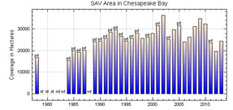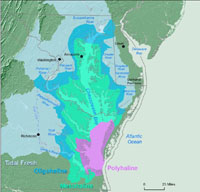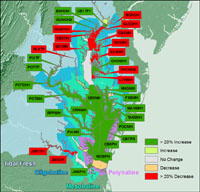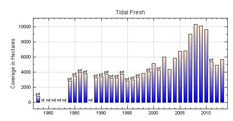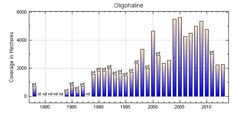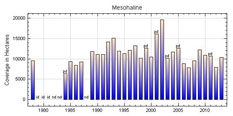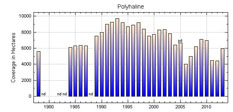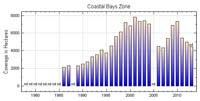|
||||||||||||||||||||||||||||||||||||||||||||||||||||||||||||||||||||||
|
The 2013 distribution of submerged aquatic vegetation (SAV) in Chesapeake Bay and its tributaries was mapped from black and white aerial photographs. These were taken between May and November 2013, at a scale of 1:24,000, encompassing 168 flight lines. CHESAPEAKE BAY For 2013, 24,164 hectares (59,711 acres) of SAV were mapped in Chesapeake Bay and its tributaries. Notable changes in SAV distribution were measured between 2013 and 2012. SAV increased 24% from 19,503 ha (48,195 ac) to 24,164 ha (59,711 ac). Until this year, grasses were mapped by geographic zone. This year the geographic zones have been replaced by four salinity zones to reflect the communities of SAV species found in the Chesapeake Bay: Tidal Fresh, Oligohaline, Mesohaline, and Polyhaline. SAV increased in all four salinity zones in the Chesapeake Bay. In 2013, SAV increased in 34, decreased in 27, and remained unvegetated in 32 of the 93 CBP segments. The 4,660 ha increase in baywide SAV coverage in 2013 represents a recovery from strong declines in 2011 and 2012 that reduced SAV abundance to a level last reported for the Bay in 1986. The 2013 increase was the result of a strong increase in the Tidal Fresh (743 ha), Mesohaline (2,344 ha), and Polyhaline (1,532 ha) salinity zones and almost no change in the Oligohaline salinity zone (41 ha increase). In 2013, the increases in the Mesohaline and Polyhaline salinity zones are due primarily to a rapid expansion of widgeongrass, including areas where SAV had not been mapped by previous surveys. However this species has had boom and bust cycles throughout the history of this survey. In addition, we are noting a modest recovery of eelgrass in the polyhaline areas where the hot summers of 2005 and 2010 resulted in dramatic diebacks. The largest SAV bed in the bay, on the Susquehanna Flats in segment CB1TF1, persisted through 2012 and shows an increase in coverage in 2013 despite the impacts from Hurricane Irene and Tropical Storm Lee in 2011. Tidal Fresh Bay Salinity Zone In the Tidal Fresh Bay Zone (19 CBP segments), SAV increased 15% from 4,916 ha (12,148 ac) in 2012 to 5,659 ha (13,985 ac) in 2013. Three of the 19 segments increased by at least 20% and by at least 5 ha from 2012 totals.
Two of the 19 segments decreased by at least 20% and by at least 5 ha from 2012 totals:
Five of the 19 segments remained unvegetated in 2013. Oligohaline Bay Salinity Zone In the Oligohaline Bay Zone (25 CBP segments), SAV increased 2% from 2,230 hectares (5,511 ac) in 2012 to 2,272 hectares (5,613 ac) in 2013. Three of the 25 segments increased by at least 20% and by at least 5 ha from 2012 totals:
Five of the 25 segments (decreased by at least 20% and by at least 5 ha from 2012 totals:
Ten of the 25 segments remained unvegetated in 2013. Mesohaline Bay Salinity Zone In the Mesohaline Bay Zone (41 CBP segments), SAV increased 30% from 7,939 hectares (19,619 ac) in 2012 to 10,283 hectares (25,410 ac) in 2013. Eleven of the 41 segments increased by at least 20% and by at least 5 ha from 2012 totals:
Six of the 41 segments (decreased by at least 20% and by at least 5 ha from 2012 totals:
Eighteen of the 41 segments remained unvegetated in 2013. Polyhaline Bay Salinity Zone In the Polyhaline Bay Zone (8 CBP segments), SAV increased 35% from 4,418 ha (10,917 ac) in 2012 to 5,950 ha (14,703 ac) in 2013. Four of the 8 segments increased by at least 20% and by at least 5 ha from 2012 totals:
None of the 8 segments decreased by at least 20% and by at least 5 ha from 2012 totals: One of the 8 segments remained unvegetated in 2013. Delmarva Peninsula Coastal Bays Zone For 2013, 4,478 hectares (11,065 ac) were mapped in the Delmarva Peninsula Coastal Bays Zone (Assawoman, Isle of Wight, Sinepuxent, Chincoteague, and Southern Virginia coastal bays). Turbid conditions in 2013 prevented us from mapping a small portion of Chincoteague Bay and all of Hog Island, Spidercrab, and Cobb bays, representing 365 ha of SAV in 2012 (954 ac), 8% of the zone total. Comparing the same mapped regions between 2012 and 2013, SAV increased 9% from 4,024 hectares (9,944 ac) in 2012 to 4,400 hectares (10,872 ac) in 2013. In order to ensure a valid analysis of change in SAV distribution and abundance given the reduced region mapped in 2013, all direct comparisons to 2013 in the report are restricted to only those regions that were mapped in both years. For comparison purposes, partial totals for 2012 have been computed for the Coastal Bays Zone and the CHNPH segment using only those regions mapped for both years. One of the 10 segments increased by at least 20% and by at least 5 ha from 2012 totals:
None of the 10 segments decreased by at least 20% and by at least 5 ha from 2012 totals: Two of the 10 segments remained unvegetated in 2013. |
